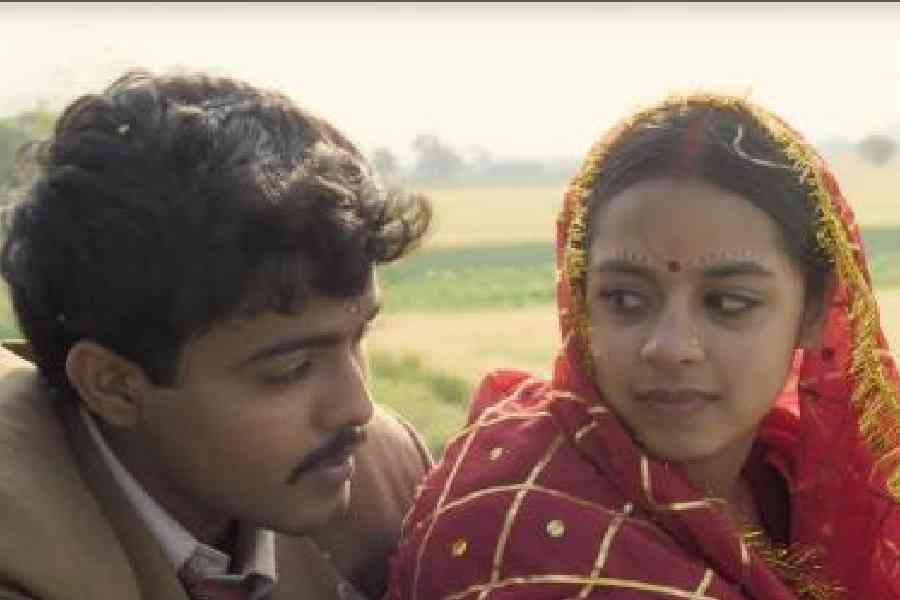Aagey nahin, neechey dekh ke chalna seekho.”
What may seem like an innocuous instruction/ cautionary call is loaded with meaning and metaphor. The film is Laapataa Ladies, which, set in the Hindi heartland, talks about issues — relating to patriarchy and the position of women in society — with tone and treatment which has both resonance and relevance. However, the film — as has increasingly become a staple of any story emerging from the hinterland — doesn’t use violence and vitriol to push its message across. It does so through the prism of humour.
The year is 2001. The players in this Kiran Rao directorial — her second after 14 years — are simple but layered, each with a story of their own, dreams that may or may not be fulfilled and armed with motivations that may seem straight and undemanding but are strong enough to make them act out of character often.
The sentence that this review starts with is both literal and metaphorical. The long, opaque veil that newly married women are made to wear like second skin blocks out the world from them and, in turn, makes them invisible to the world. It is a clever plot device that Kiran and her co-writers Sneha Desai and Divyanidhi develop sharply and succinctly from the seed of Biplab Goswami’s original story (named ‘Two Brides’). Whatever we see in Laapataa Ladies is Kiran’s own, imbued as it is with a certain attitude and aesthete, sensibility and sensitivity that has come to be associated with her.
Perhaps an ode to Tagore’s Noukadubi — the early 20th-century novel about veiled brides being exchanged by mistake while on their way to their respective husband’s houses — Laapataa Ladies, co-produced by Aamir Khan, is centred around the lives of Deepak (Sparsh Shrivastava), Phool (Nitanshi Goel) and Jaya (Pratibha Ranta). Almost a child bride, Phool can barely walk a few steps with the long veil. She latches on to her husband Deepak’s arm and leaves her parental home for his village whose name she doesn’t even know well enough to remember.
From a train teeming with dowry-boasting grooms and demure veiled brides, Deepak inadvertently walks out holding Jaya’s hand, leaving a sleeping Phool behind. It is only when he reaches home and the bride’s veil is lifted does the family realise that it is not Phool that Deepak has brought home. Thereafter begins a story that combines coming-of-age, social commentary and even suspense, most of which is written and executed well enough to keep the viewer invested.
At its heart, Laapataa Ladies is a simple tale of switched identities, but Kiran makes it much more. With the aid of situational comedy and some crisp-as-a-whip lines, the filmmaker casts an eye on the plight and pathos of women, with the fictional state of Nirmal Pradesh emerging as a microcosm of India, much like the lives of four characters became a representation of the diversity and dynamism of Mumbai in Kiran’s directorial debut Dhobi Ghat.
Laapataa Ladies works within the broad parameters of a social drama which asks quite a few questions but doesn’t make it on the nose. Kiran expertly milks the situations in the film for comic fodder as well as to comment on the times we live in.
The title itself has a dual meaning. First is the literal meaning of two women getting lost. The second is about all the women who have lost their identities to fit in. Talented, spunky, ambitious, spirited women who, bogged down by societal suppression in varying degrees, have been lost to the world forever.
These are woman, as we see in the film, who, apart from the ubiquitous veil, are forbidden to utter their husband’s names. These are women who have given up what they loved eating because of the ingrained belief that their wants don’t count. These are women who can’t study or work and are saddled off once they reach marriageable age. There is a lot in Laapataa Ladies that tugs at your heartstrings but Kiran adds a lightness of touch to make them palatable.
There is also a touch of the political tucked in. A tongue-in-cheek comment on the political regime’s habit of changing the names of cities and towns (‘sarkaar badli, gaaon ka naam bhi badla’) is not lost on the discerning viewer. A key character named Manju Maai (played by Chhaya Kadam) — who Phool finds both solace and a sense of freedom in after losing Deepak on the train — comments that she left her husband because he thought that slapping her every day was his way of expressing love. If we didn’t know better about the timeline of Laapataa Ladies (it was shot during the pandemic), we would be inclined to believe that Kiran is taking a swipe at Animal maker Sandeep Reddy Vanga, whom she has been semi-feuding with of late.
What works for Laapataa Ladies — despite the impression that the film is too occupied with ticking off some woke boxes in broad strokes — is its fresh players and fresh treatment. While the three young leads handle their roles with the kind of ease reserved for veterans, it is Ravi Kishan as a garrulous but honest cop who is the ultimate scene stealer. So is Ram Sampath’s music with the wacky lyrics of Doubtwaa emerging as an it-is-here-to-stay earworm.
Laapataa Ladies is a gently biting satire with a strong feminist heart. It does feel too message-y at times, but we are willing to overlook that. Sometimes, intent is all that matters.
I liked/ didn’t like Laapataa Ladies because... Tell t2@abp.in










